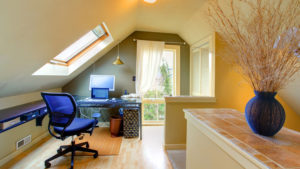Why this room is becoming more important
Real Property Management Coast in Orange County is happy to bring you this article by Amy Hoak from Marketwatch.com. At Real Property Management, we stay on top of market and real estate trends. Here is why we think the home office is an important asset.
Amy Hoak – Marketwatch.com

With mobile technology, it’s easy to work in any room of a house. And yet, according to designers and home builders, the home office is becoming one of a home’s must-have features.
Dedicated office space might not always be a full room. In fact, it might be a nook with desk space on the landing of a staircase or a corner of a bedroom or family room. But as people do more work away from the office and kids do more work outside of the library, the home office is growing in importance.
“That office or desk space is becoming as essential as the family room,” said Mollie Carmichael, who leads the consumer research team at John Burns Real Estate Consulting, based in Irvine, Calif. And that’s true no matter how large of a home it is, from a small apartment to a large single-family home, she added.
In fact, 77% of people surveyed by John Burns said that any additional rooms not dedicated as bedrooms would be used as an office in their next home — the most popular response. (Fifty-six percent said they’d use the extra space as a guest room, 25% said multipurpose room.)
Home appraisers are returning to dubious practices seen before the financial crisis, as they inflate the values of some properties they assess.
There’s also some evidence that home offices can make a home more attractive to buyers. According to Remodeling Magazine’s 2014 Cost versus Value report, you can recover an average 48.9% of the cost of a home office remodel at resale, up from 43.6% in 2013 and 42.9% in 2012. A midrange office remodel, as defined by the report, is a $28,000 investment that involves installing custom cabinets that include 20 feet of laminate desktop, a computer workstation and wall cabinet storage, along with rewiring of the room for computer, fax machine, cable and telephone lines.
There are a couple of reasons that people are demanding a dedicated office space.
“For one, it gives them a place to collect all the paperwork and miscellaneous stuff they need to run the household, as well as for the work they may be doing from home for their job,” said Elissa Morgante, co-principal of Morgante-Wilson Architects, based in Evanston, Ill., in an email. “And secondly, it is helpful to have a space that is dedicated to work and not filled with other distractions—plus they have all the things they need within arm’s reach. I think it helps focus and provides a sense of intention.”
If you’re one of the growing number of people who regularly work from home, you’re more apt to want an office space away from the center of the house, Morgante said. The number of people who work from home on a regular basis (and are not self-employed) grew by 89.8% from 2005 to 2013, to 3.5 million employees, according to data from Global Workplace Analytics, a consulting and research firm that studies work-at-home trends. The most recent statistics show that 2.5% of the workforce works from home at least half of the time, said Kate Lister, president of the organization.
Those who don’t regularly work from home may want the office space on the first floor, close to the center of the home, Morgante said. Workspace near the kitchen or great room can make it easier for parents to keep their eyes on kids—whether it’s the adults or the children who are working at the desk space. With an open office area, kids are also prevented from sequestering themselves in their rooms with laptops, she said.
“I think in five to 10 years from now it is going to become a big conversation about how to keep kids engaged and present in the family, because the constant chatter with friends and outside stimulation on their phones and devices is very addictive,” Morgante said.
Builders are getting creative in setting up office-friendly areas for their new-home customers. Some buyers are requesting office spaces be put in places that are often underused, such as large landings on staircases, or lofts, said Jeff Benach, co-principal of Lexington Homes, a builder based in the Chicago area.
Home offices have become a growing priority over the past five years, he said. Even in Lexington’s townhouses where floor plans are smaller, most often people choose the option to have a flexible space that can be used as an office, den or playroom in the home, as opposed to having a larger kitchen, Benach said.
Having a specific area dedicated as a home office may make it easier for those who work from home to deduct office expenses on their income taxes. But remember: You need to regularly use that room or area exclusively for conducting business, and if you are an employee and you work from home, your business use needs to be for your employer’s convenience, among other stipulations. (For more information see the Internal Revenue Service’s guidelines on the home office deduction.)
